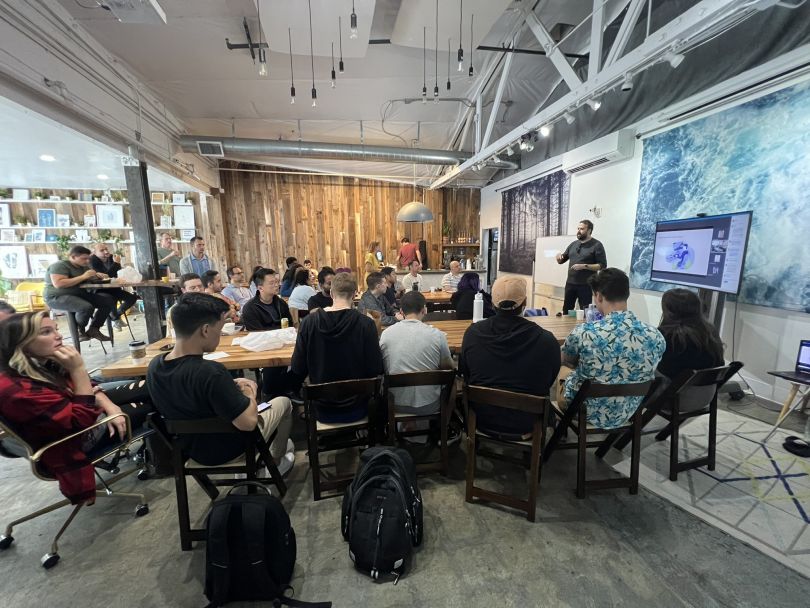These days, the question, “where is your office located” can elicit answers ranging from a sprawling campus in San Francisco to a hotel lobby in a remote corner of the world.
In the tech industry, where discourse surrounding work-life balance and hybrid schedules are increasingly hot topics, perks and benefits have become the comparative metric for gauging employers of choice. According to project management company TeamStage, 13 percent more companies have invested more in benefits over the last five years, and 83 percent are looking to increase ones centered on wellness.
Among those bolstering their compensation package is software company Courier, whose digital tools enable developers to integrate multi-channel product notifications into apps on various platforms. The company recently pivoted from local talent recruiting — keeping its San Francisco office open — to a permanent remote policy.
“We found that even though there were candidates who did indeed appreciate our commitment to maintaining a physical presence, there were many more who wanted the flexibility afforded by remote work,” said VP of Strategy and Operations Aman Kandola in the company’s internal blog. “By shifting to a remote-first approach, we could actually offer an attractive work environment to both of those types of candidates and, after experimenting with this approach for a few of our open roles, we saw a large increase in our inbound talent pipeline for those roles.”
As economic circumstances and working demographics shift over time, elements of total compensation once prioritized by the workforce are now replaced by parental leave offers and PTO flexibility. Salary bands might be competitive, but the deciding factor for both talent retention and acquisition often rests on eye-catching perks and head-turning benefits; often, it’s as simple as being able to work from home.
The perks
- Unlimited PTO
- 14 weeks fully paid parental leave
- Home office set up stipend
- Mental and physical health bonuses and programs
As a gesture of faith for its remote commitments, Kandola pledged that compensation would be the same regardless of geographic location. The company also instituted complete transparency regarding pay, defined policies for cultural and communication expectations and a revamped review process for new hires — all to facilitate culture-building in a purely virtual environment.
It’s easy to check off policy-making boxes on paper, but Courier appeals to the pathos of its culture through company outings and events. Last December, the engineering team held an internal hackathon competition called Dispatch, where ideation can become realized products for Courier.
“This type of engineering culture and output is something that’s rare and special to stand behind from a sales point of view,” Shane Nordstrand, enterprise account executive, highlighted in a social post celebrating the event.
Outside of work, Courier invests in the social wellness of its small team as well, with in-person days comprising go-karting and sailing. These flashes of enriching work culture often spring from the creative minds of Courier’s PeopleOps team, such as Coordinator Sophia Blistein. The inspiration for her team-centered enthusiasm is rooted in initial impressions of the company, when a hiring interview cemented her faith in Courier’s people-forward culture.
“When candidates ask why I joined Courier, I often share the moment where I messed up my salary negotiations because I was afraid of pricing myself out of the job,” Blistein recalled in a social media post. “Aman Kandola immediately said, ‘Oh that’s much lower than we’re offering for this role’ and countered with 20 percent more. This ended up being just one example of how Courier walks the walk when it comes to looking after their employees, and it’s been really gratifying to play a part in that.”

The Art of Attracting Talent
In a competitive job market, the other side of the coin sees companies fighting for top candidates while retaining their own. It’s a constant flux that talent and people teams have to navigate, and it’s especially volatile during uncertain economic conditions.
Fortunately, by applying broad strokes to its talent acquisition strategy, Courier has laid the foundations for a frictionless recruiting pipeline — a hiring philosophy centered on the idea that if the terms are good enough, qualified talent will come.
“Our compensation philosophy at Courier has historically been to target the 90th percentile of market rates,” Kandola explained in an internal post. “Every time we hire for a role, we try to review our compensation banding and update it to ensure [that’s what] we’re truly offering our candidates.”
Underlying additional bells and whistles is also the promise of an inclusive work culture. Compensation can compel people through the door, but it takes a cohesive team to avoid employment churn.
“Attracting the best employees to your organization and keeping them around requires a space where support and collaboration are normalized,” Kandola added.
The Perk of Financial Security
As an affirmation of its mission, Courier CEO and Founder Troy Goode recently announced a $35 million Series B funding round, led by Google Ventures. With an influx of capital, the team is primed to push forward with improvements in mobile notifications without needing to tread the murky depths of economic uncertainty. As an added bonus, candidates naturally gravitate towards employers that have brighter futures. “Our mission to make notifications delightful is a big one and there’s still a ton of work to do,” Goode said in a press release.

Diversifying Success and Collaboration
In her first interview with Courier, Software Engineer Nathalia Sandoval recalls her now-boss making sure he had the right pronoun usage.
“It was a small gesture,” she said in an internal post. “The moment hinted at a company culture built around treating people with respect and appreciating authenticity.”
It’s almost impossible to form a strong work culture without considering inclusivity — diverse teams excel in collaboration, generate more money and improve innovation for their company. More than just team synergy, companies that make intentional efforts to platform DEIA policies contribute to better talent retention and hiring. Allowing employees to be themselves not only generates better productivity but also induces job satisfaction.
“The moment hinted at a company culture built around treating people with respect and appreciating authenticity.”
Before long, the patchwork of different experiences and background translates to a tight-knit team infused with a sense of belonging.
“You should prioritize diversity for your organization because it’s the right thing to do,” Sandoval advised. “If you can build an inclusive environment where employees like me can be their real selves, every part of the business will benefit, too.”









